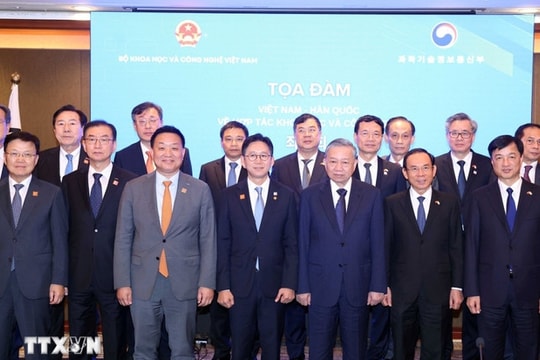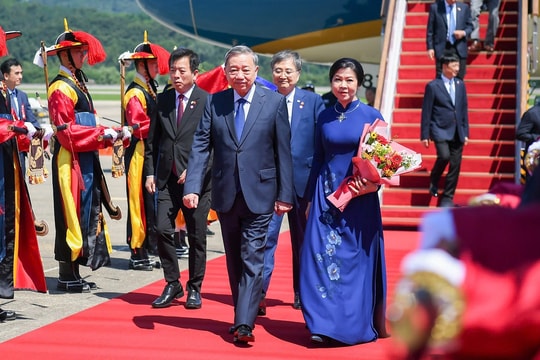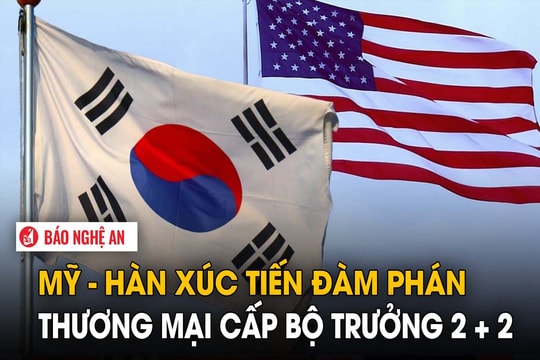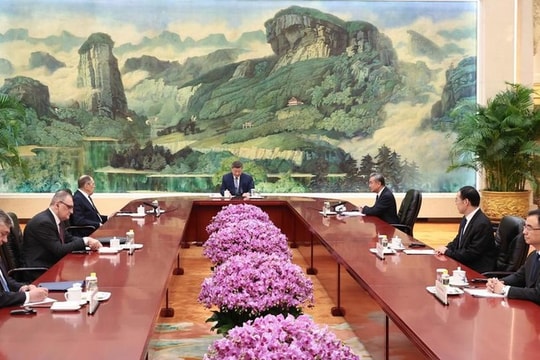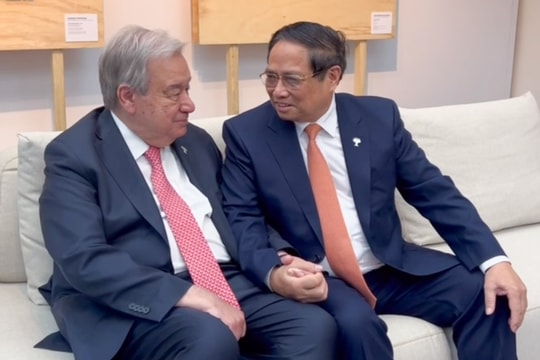Deepening and expanding the Vietnam-Japan strategic partnership
Vietnam and Japan are both located in the Asia-Pacific region. The political trust, cultural similarities between the two peoples as well as the impressive achievements of cooperation over the past 40 years are a solid foundation and strong driving force to bring the Vietnam-Japan relationship to a new level, towards the future of a deep strategic partnership.
 |
| Japanese Prime Minister Shinzo Abe welcomes Prime Minister Nguyen Xuan Phuc during his visit to Japan, May 2016. (Photo: Thong Nhat/VNA) |
Since the establishment of diplomatic relations on September 21, 1973, the relationship between Vietnam and Japan has been continuously strengthened and developed with increasingly deep cooperation. The two countries established a framework of long-term, stable and trustworthy partnership during the visit to Vietnam by Japanese Prime Minister Junichiro Koizumi in April 2002.
Japan was the first country among the G7 countries to establish a strategic partnership with Vietnam. During General Secretary Nong Duc Manh's official visit to Japan in April 2009, the two countries agreed to upgrade their relationship to a strategic partnership for peace and prosperity in Asia.
In October 2010, the two countries issued the Vietnam-Japan Joint Statement on Comprehensive Development of the Strategic Partnership for Peace and Prosperity in Asia, during Japanese Prime Minister Naoto Kan's visit to Vietnam.
Notably, during President Truong Tan Sang's State visit to Japan in March 2014, the two countries upgraded their relationship to an extensive strategic partnership for peace and prosperity in Asia.
During his official visit to Japan in September 2015, General Secretary Nguyen Phu Trong and Japanese Prime Minister Shinzo Abe issued a Statement on the common vision of Vietnam-Japan relations.
Strengthening political and diplomatic relations
Over the years, the political relationship between Vietnam and Japan has been consolidated and strengthened, increasingly becoming more substantial, on the basis of similar strategic interests. The relationship between the two countries is at its best stage in history since the establishment of diplomatic relations and has high trust. The two countries' senior leaders regularly maintain visits and contacts at international and regional forums. Japanese Prime Minister Shinzo Abe chose Vietnam as the first country to visit after taking office for his second term in January 2013 and was the first leader among the G7 countries to invite the Vietnamese Prime Minister to attend the expanded G7 Summit.
Cooperation between the two National Assemblies has been enhanced through exchanges of high-level delegations and between specialized committees. The Vietnam-Japan Friendship Parliamentarians' Group and the Japan-Vietnam Friendship Parliamentarians' Alliance have maintained regular contact and active and effective cooperation.
The two sides have also effectively maintained dialogue mechanisms such as the Vietnam-Japan Cooperation Committee co-chaired by the two Foreign Ministers since 2007; the Vietnam-Japan Strategic Partnership Dialogue on diplomacy, security and defense at the Deputy Foreign Minister level since 2010; the Vietnam-Japan Defense Policy Dialogue at the Deputy Minister level since 2012; and the Security Dialogue at the Deputy Minister level since 2013.
Vietnam and Japan support each other at multilateral forums such as the United Nations, ASEAN, APEC, ASEM, the United Nations Human Rights Council... Vietnam supports Japan to become a non-permanent member of the United Nations Security Council for the 2016-2017 term.
Vietnam's leading economic partner
Japan is currently Vietnam's leading economic partner and the first G7 country to recognize Vietnam's market economy status (October 2011). Japan identifies economic cooperation with Vietnam as a focus in promoting bilateral relations.
In trade cooperation, Vietnam and Japan have granted each other most-favored-nation tariffs since 1999 and signed an Economic Partnership Agreement in October 2009, creating a favorable legal framework for enhancing trade relations between the two countries. In 2015, Japan was Vietnam's fourth largest trade partner with bilateral trade turnover reaching 28.526 billion USD. As of November 2016, the two countries' trade turnover reached 26.8 billion USD, of which Vietnam's exports to Japan reached 13.21 billion USD (up 2.7% over the same period in 2015), and imports reached 13.6 billion USD (up 3.3%).
Regarding investment, the two sides signed an Investment Promotion and Protection Agreement in December 2004. As of November 2016, Japan had 3,242 valid investment projects in Vietnam with a total registered investment capital of 42.016 billion USD and 296 newly licensed projects, 195 projects with increased capital with a total newly registered and increased investment capital of 1.95 billion USD, ranking 2nd out of 112 countries and territories investing in Vietnam (after Korea).
Regarding official development assistance (ODA), Japan is the largest ODA donor to Vietnam, accounting for about 30% of the international community's total ODA commitments to Vietnam. From 1992 to the end of fiscal year 2015, Japan provided about 29.5 billion USD in aid to Vietnam. In fiscal year 2015 alone, Japan committed ODA loans to Vietnam of more than 310.08 billion Yen (about 2.5 billion USD), the highest level ever. Vietnam's ODA disbursement (excluding loans from budget support programs) reached 22%, equivalent to 147 billion Yen, ranking second (after India) among countries using Japanese ODA loans.
Many Japanese projects have been completed and put into operation very effectively, contributing greatly to the socio-economic development of Vietnam. Recently, there are three major infrastructure projects in Hanoi Capital, including Nhat Tan Bridge, the road connecting Nhat Tan Bridge with Noi Bai International Airport, and Terminal T2 of Noi Bai International Airport, all invested by ODA capital from the Japanese Government and domestic counterpart capital. These three projects were inaugurated and put into use in early 2015, playing an important role in the socio-economic, cultural and tourism development of the Capital and the whole country.
In addition, Japan is actively supporting Vietnam in industrial development within the framework of Vietnam's Industrialization Strategy within the framework of Vietnam-Japan cooperation until 2020, with a vision to 2030.
Agricultural cooperation has made a breakthrough since 2014. The two sides signed the Medium and Long-Term Vision on Vietnam-Japan Agricultural Cooperation during General Secretary Nguyen Phu Trong's official visit to Japan in September 2015.
In the tourism sector, in 2016, the number of Japanese tourists to Vietnam reached 740,592, an increase of 10.3% compared to 2014, ranking 3rd (after China and Korea). The number of Vietnamese tourists to Japan in 2015 was 185,400; in 11 months of 2016, it reached 220,700, an increase of 26.1%.
Good cooperation in other areas
The friendship has inspired mutual assistance and support activities between Vietnam and Japan in many fields including consular cooperation, education, human resource training, labor, climate change response, and local exchanges.
Regarding consular cooperation, according to statistics from the Japanese Ministry of Justice, as of December 2016, there were 124,820 Vietnamese people in Japan and about 13,500 Japanese people in Vietnam. Japan opened a Consulate General in Ho Chi Minh City (March 1997) and Vietnam opened Consulates General in Osaka City (March 1997) and Fukuoka City (April 2009). In June 2010, Vietnam appointed two Honorary Consuls General in Nagoya City and Kushiro City.
From January 1, 2004, Vietnam exempted visas for Japanese citizens traveling and doing business in Vietnam for 15 days and from July 1, 2004, decided to exempt short-term entry visas for all citizens holding Japanese passports. On March 8, 2005, Vietnam and Japan exchanged a diplomatic note exempting entry visas for citizens of the two countries holding diplomatic and official passports for stays of no more than 90 days, effective from May 1, 2005.
Japan began to relax the multiple-entry visa regulations from September 30, 2014, and further relaxed them from February 15, 2016, and single-entry visas from November 20, 2014 for Vietnamese citizens.
Cooperation in education and training between the two countries has developed in many forms. Japan is one of the largest non-refundable aid countries for Vietnam's education and training sector. The two sides have signed many cooperation documents in the field of educational cooperation. The number of Vietnamese students studying in Japan is currently 38,882.
Japan is cooperating to upgrade four Vietnamese universities to high-quality universities (Can Tho University, Danang University, Hanoi National University, Hanoi University of Agriculture); is cooperating to build the Vietnam-Japan University to train high-quality human resources for Vietnam in the fields of science and technology, management and services; and supporting Vietnam to teach Japanese at some primary schools in Hanoi and Ho Chi Minh City.
Regarding labor cooperation, since 1992, Vietnam has sent many trainees to Japan. Currently, there are more than 45,000 Vietnamese workers and trainees in Japan in the fields of industry and agriculture. The two sides signed a Memorandum of Understanding on Japan receiving Vietnamese nurses and caregivers within the framework of the Economic Partnership Agreement (EPA) in October 2011. The first batch of 138 nurses and caregivers, the second batch of 137 people have gone to Japan.
Cooperation in responding to climate change has developed strongly and substantially in recent years with Japan continuously providing ODA for climate change response projects in Vietnam. During Prime Minister Nguyen Xuan Phuc's visit to Japan and attendance at the G7 Summit in May 2016, Prime Minister Abe announced non-refundable emergency assistance of 2.5 million USD to respond to drought and saltwater intrusion and said that Japan would study supporting Vietnam in responding to climate change in the medium and long term. In addition, facing the increasingly serious environmental pollution, Japan has also implemented support for Vietnam to improve the urban environment in a systematic manner.
Local cooperation between Vietnam and Japan has also been strongly promoted, many localities of the two countries have signed cooperation documents such as Ho Chi Minh City-Osaka (2007), Da Nang-Sakai (2009), Hanoi-Fukuoka, Da Nang-Yokohama, Ho Chi Minh City-Yokohama, Dong Nai-Hyogo, Ba Ria-Vung Tau - Kawasaki (2013), Phu Tho-Nara, Hue-Kyoto (2014), Hung Yen-Kanagawa, Hai Phong-Niigata and Nam Dinh-Miyazaki (2015).
The successes that Vietnam and Japan have achieved are important milestones contributing to consolidating and comprehensively developing the extensive strategic partnership, meeting the wishes and interests of the people of the two countries, for peace, cooperation and development of the Asia-Pacific region./.
According to Vietnamplus

.jpg)
.jpg)
